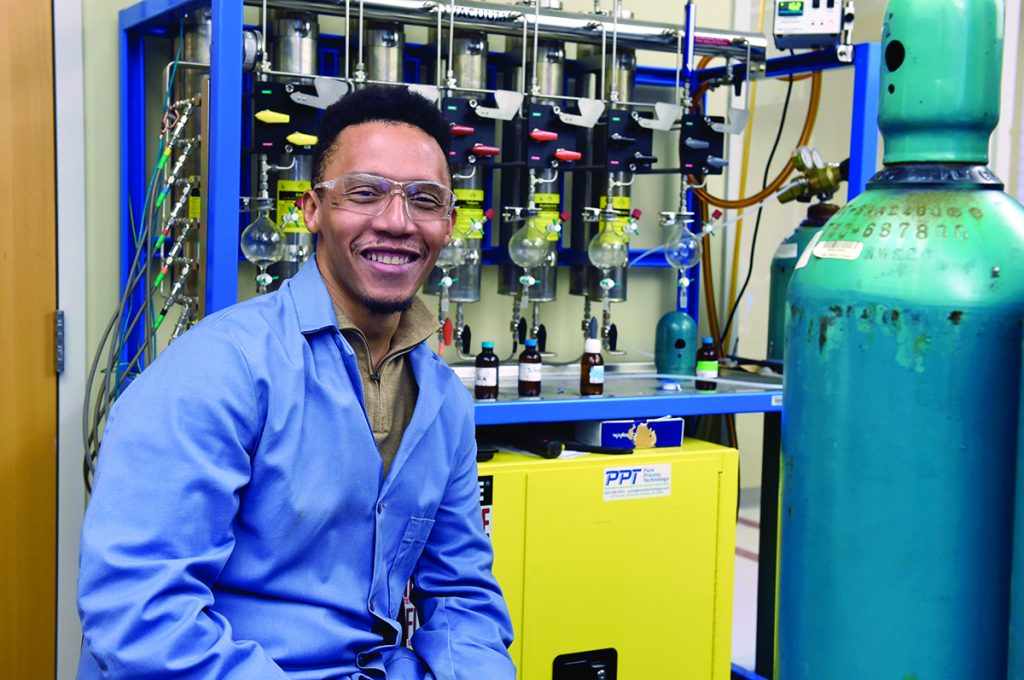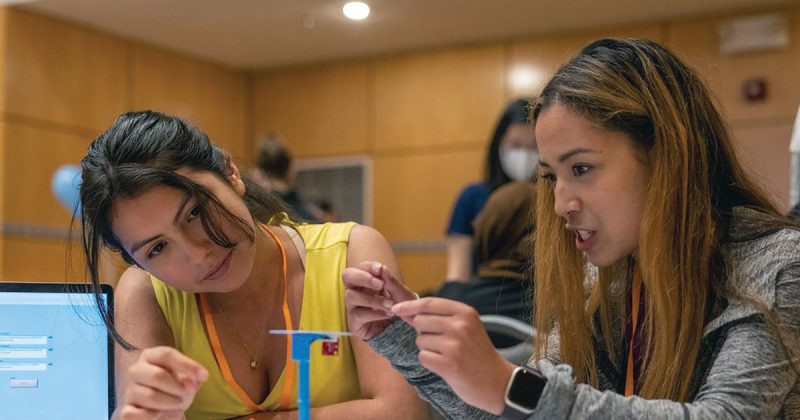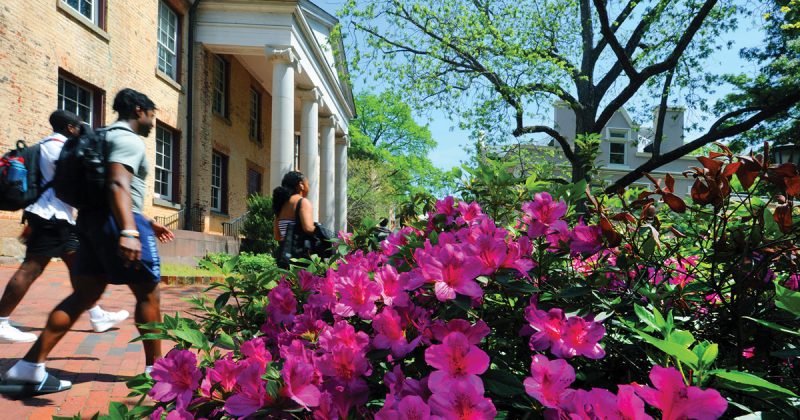
“Science is critical to how society functions,” said chemist Sidney Wilkerson-Hill, who has won awards for both his teaching and research. (photo by Donn Young)
Organic chemist Sidney Wilkerson-Hill is using a Sloan Research Fellowship to develop new small-molecule pesticides to combat mosquitoes that cause malaria.
Sidney Wilkerson-Hill uses chemistry to transform lives, both those of his Carolina students and people throughout the world who benefit from pharmaceuticals inspired by nature and refined through molecular innovations.
Wilkerson-Hill joined the UNC faculty in 2018. His lab explores ways to make synthetic cyclopropanes, the smallest molecular rings, which contain only carbon atoms.
“There’s something special about being able to manipulate naturally occurring molecules to create drugs and pharmaceuticals that we use on a day-to-day basis,” said the assistant professor of chemistry.
A key focus of his research is developing new pyrethroids — small-molecule pesticides used to combat malaria-causing mosquitos — since overuse of current pyrethroids has led to resistance among disease-causing pests. He received a 2024 prestigious early-career Sloan Research Fellowship to continue to pursue this work. (Learn more about UNC’s two Sloan winners.)
“Given the steady increase in global temperatures, researchers have predicted that insect vectors for malaria will continually become more challenging to combat,” Wilkerson-Hill shared in his Sloan research statement.
Growing up in Kinston, North Carolina, Wilkerson-Hill planned to follow the military path blazed by his large family: His dad served as a career Marine, and seven uncles enlisted in different branches of the service. Wilkerson-Hill’s trajectory toward science was facilitated by a fortuitous meeting at a regional Science Olympiad with Philip Dail, then director of the statewide North Carolina Science Olympiad. Dail, who also taught chemistry part time at NC State University and ran the program for first-year students at the NC State Wilson College of Textiles, watched as Wilkerson-Hill won all the chemistry events.
After the awards ceremony, Dail asked Wilkerson-Hill about his post-secondary plans. “I told him, ‘I’m thinking about going into the military,’” said Wilkerson-Hill. “He said, ‘No; here’s my card so you can keep in touch. When you’re ready to graduate, I will make sure you have a spot at NC State.’” Fast forward to 2010 when Wilkerson-Hill graduated from NC State with honors and two undergraduate degrees. He went on to the University of California, Berkeley, for his doctorate in chemistry and a post-doctoral fellowship at Emory University.
While at Carolina, Wilkerson-Hill has been lauded both for his teaching and research. One of his most meaningful accolades is the 2023 Tanner Award for Excellence in Undergraduate Teaching.
“To receive that and to be nominated and recommended by students for teaching organic chemistry, everybody’s least favorite class, is really an honor,” said Wilkerson-Hill. He said that his job as a professor is to empower students because when he helps students take control of their own learning, they will become successful.
Wilkerson-Hill was also recently awarded the FMC Corporation’s New Investigator Award, which recognizes outstanding early-career professors whose science and research will lead to future breakthroughs. Last year, he was recognized with the Junior Scientists Participation Fellowship for the Bürgenstock Conference, awarded by the Division of Fundamental Research of the Swiss Chemical Society to promising young scientists who are at the beginning of their academic careers. In addition, he is the recipient of a highly regarded NSF CAREER Award. Committed to broadening the field, Wilkerson-Hill is active in programs to address disparities facing people of color pursuing careers in the physical sciences.
He is a fierce advocate for the power of science.
“We are in an interesting time where folks are unsure of the role of science in their day-to-day lives,” Wilkerson-Hill said. “I like to remind the public that science is critical to how society functions.”
By Michele Lynn
Published in the Spring 2024 issue | Faculty Up Close, Tar Heels Up Close
Read More

Two new degrees offered in applied sciences, data science
The department of applied physical sciences will offer its first…

Parker receives Jefferson Award, one of UNC’s highest honors
Institute for the Arts and Humanities Director Patricia Parker accepted…

Inaugural leader and new minor for School of Civic Life and Leadership
The new School of Civic Life and Leadership has appointed…

